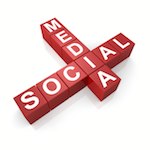Digital Healthcare Decisions: Social Media Opportunity for Marketers
 The virtual environment of social media is growing in importance as a vital connecting point. Social media is the online environment where consumers (prospective patients) evaluate healthcare providers, and make decisions about their health, medication and hospitals. A new Health Industries Group/PwC study declares “Social media is changing the nature of healthcare interaction, and health organizations that ignore this virtual environment may be missing opportunities to engage consumers.”
The virtual environment of social media is growing in importance as a vital connecting point. Social media is the online environment where consumers (prospective patients) evaluate healthcare providers, and make decisions about their health, medication and hospitals. A new Health Industries Group/PwC study declares “Social media is changing the nature of healthcare interaction, and health organizations that ignore this virtual environment may be missing opportunities to engage consumers.”
What’s wrong with this picture? The dichotomy—and emerging social media marketing challenge—is that the public demand at this intersection out distances that of healthcare providers, institutions and organizations, says PwC.
“The report found that social media activity by hospitals, health insurers and pharmaceutical companies is miniscule compared to the activity on community sites. While eight in 10 healthcare companies had a presence on various social media sites, community sites had 24 times more social media activity than corporate sites.
"Health organizations have an opportunity to use social media as a way to better listen, participate in discussions and engage with consumers in ways that extend their interaction beyond a clinical encounter. Savvy adopters are viewing social media as a business strategy, not just a marketing tool."
Titled Social media “likes” healthcare: From marketing to social business, PwC reports that one-third of consumers now use social media sites such as Facebook, Twitter, YouTube and online forums for health-related matters, including seeking medical information, tracking and sharing symptoms, and broadcasting how they feel about doctors, drugs, treatments, medical devices and health plans.
The affect of social media on health decisions is strong—and evidently growing—with over 40 percent of respondents saying it would influence issues of second opinion, or their choice of doctor, hospital or medical facility. What’s more, more that 30 percent said social media influences decisions regarding medications and their choice of health insurance plan.
Healthcare marketers and decision-makers take note: Among the largest numbers are things that consumers want. Some 72 percent of consumers said they would appreciate assistance in scheduling doctor appointments through social media channels, and nearly half said they would expect a response within a few hours.
Not surprisingly, responses were strongly skewed toward the 18-24 age group, with more than 80 percent actively sharing health information via social media. (For the 45-64 crowd this involvement is lower at 45 percent.)
There’s important healthcare market intelligence in the PwC Study (available here.) Social media is the external-facing component that gives and receives customer input for providers and facilities. Moreover, the responsibility for social media efforts is a marketing communications function at 82 percent of health organizations.
The report observes that “Insights from social media offer instant feedback on products or services along with new ideas for innovation that could lead to higher-quality care, more loyal customers, efficiency and even revenue growth.”








